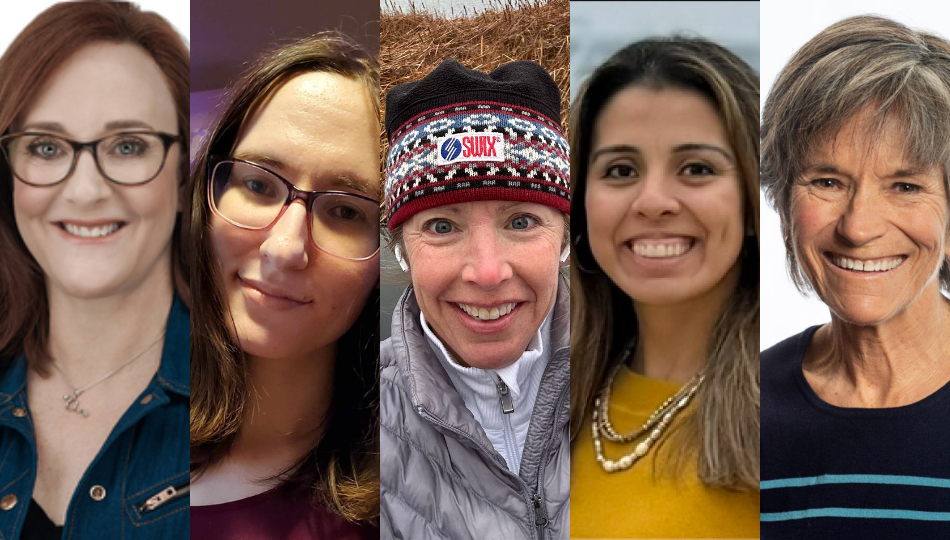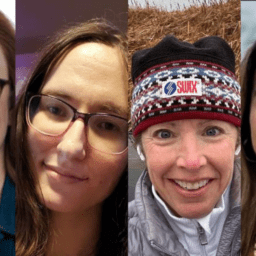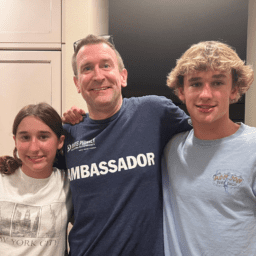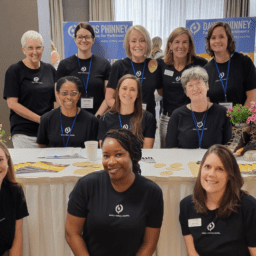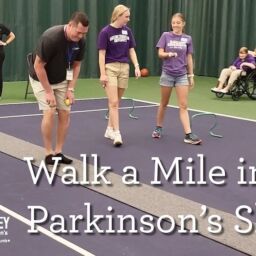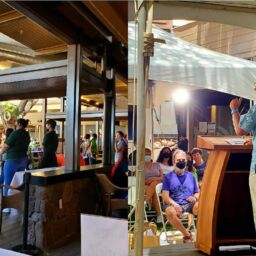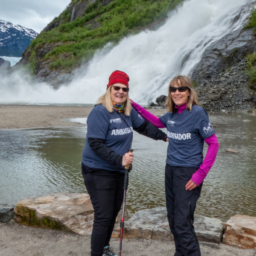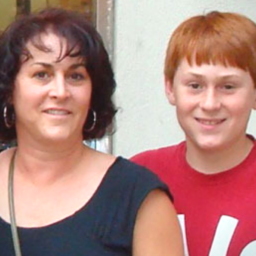In this video, Devon Fulford, Davis Phinney Foundation Director of Education and Content, talks with five women living with Parkinson’s. The panelists discuss receiving their diagnosis, changes in symptoms related to pregnancy and menstruation, self-advocacy, social pressure related to appearance and behavior, and more.
An audio version of this webinar is available.
During this webinar, the panelists describe experiencing with delays with receiving their Parkinson’s diagnosis. This isn’t uncommon: Some research shows it takes longer for women to receive a referral to a movement disorder specialist than it takes for men. Women living with Parkinson’s are also more frequently misdiagnosed than men.
In addition to being problematic and harmful, delays in diagnosis cause additional problems. A 2016 study in France reported 1.5 times more men than women are diagnosed with Parkinson’s. A 2022 study based in North America reported similar data. The authors of both studies found the difference increases with age, which suggests there may be sex-related risks and/or protective factors, but interpreting this data is more complicated due to diagnostic delay. Whether fewer women are diagnosed because fewer women live with Parkinson’s, or if fewer women are diagnosed because biases in the healthcare system lead to delay or lack of diagnosis must be explored.
Understanding whether women’s physiology decreases risks of Parkinson’s could inform new approaches to treating the disease. Unfortunately, understanding possible protective factors–as well as sex-related risks–is further hindered by the fact that women with Parkinson’s are underrepresented in Parkinson’s research.
According to a 2018 letter to Movement Disorders, despite being approximately 50% of the global population, 41% of participants in Parkinson’s clinical trials. In North America, only 15% of clinical trials featured a nearly neutral recruitment of participants with regard to sex and gender. The letter’s authors—all Parkinson’s experts—consider whether prevalence data might explain the representation differences, but they conclude that prevalence data is not sufficient to explain the representation gap.
The good news is there is progress underway! In recent years, multiple new projects launched to support research into women’s experiences living with Parkinson’s, including My Moves Matter, PregSpark, and The Women’s Parkinson’s Project. While these projects are largely sparked by women living with Parkinson’s, community support for this work is increasing.
This panel has recorded a second conversation which will be available in the coming weeks. We will continue to support women with Parkinson’s, amplify their voices and inspirational stories, and help all people living with Parkinson’s live well today.
If you have a story or perspective about living with Parkinson’s that you’d like to share, please reach out to us at blog@dpf.org.
ADDITIONAL RESOURCES
Our Young Onset Parkinson’s Women’s Council Archives
WEBINAR RECORDING: Women and Young Onset Parkinson’s with Annelien Oosterbaan
Prospective Comorbidity-Matched Study of Parkinson’s and Risk of Mortality among Women
Parkinson’s in Women and Men: What’s the Difference
Gender Aware in Parkinson’s Care
Sex-Specific Progression of Parkinson’s
Association of Women-Specific Health Factors in the Severity of Parkinson’s
Premenstrual Worsening of UPDRS Motor Scale in Women Affected by Parkinson’s
Unmet Needs of Women Living with Parkinson’s Disease: Gaps and Controversies
Meet the Speakers
 Karen Frank, MS, CRNA
Karen Frank, MS, CRNA
Karen retired from her beloved career as a certified registered nurse anesthetist after she was diagnosed with YOPD. Since retirement, Karen focuses on Parkinson’s advocacy–especially as it relates to young onset Parkinson’s and mental health. Karen runs a national support group for YOPD and has served as a Davis Phinney Foundation Ambassador since 2019. She is a public speaker and is actively involved in improving medical care for those living with Parkinson’s. Karen is currently working to establish a Pedaling for Parkinson’s class in her home community of Saint Louis.
 Jasmine Sturr
Jasmine Sturr
Jasmine Sturr is a 29-year-old scientist who has lived with juvenile onset Parkinson’s for the past 15 years. Initially, motor symptoms were the most troublesome, but DBS surgery in 2015 has greatly improved mobility. Secondary gastrointestinal dysmotility has been another significant challenge to manage, for which a feeding tube that bypasses the stomach–as well as a new medication called Motegrity, the only prokinetic safe for people with Parkinson’s–have been the management. Through the years, different advocacy and science projects within the sphere of patient innovation have become Jasmine’s career.
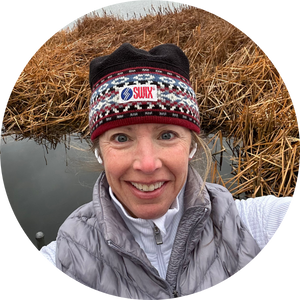 Teri Lamers
Teri Lamers
 Sandra Chu
Sandra Chu
Sandra Chu lives in Pennsylvania, just outside of the capital of Harrisburg. She is a 35-year-old stay at home mom who previously worked for 10 years in hospital and community settings as a nurse. Sandra was diagnosed in 2020 with YOPD. Besides keeping up with her 5-year-old daughter and furry (labradoodle) son, she has found a love for riding her stationary bike and has gotten back to running, which had become difficult to do when her Parkinson’s symptoms started. Sandra volunteers at a local food pantry and has recently become a DPF Ambassador.
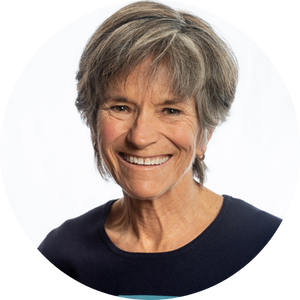 Patti Burnett
Patti Burnett
Patti is from upstate New York but moved to Colorado in 1978. She and her husband, Dan, have two married daughters and four grandchildren. Patti supervised the Copper Mountain ski patrol and trained and handled avalanche and search and rescue dogs before being diagnosed with Parkinson’s in 2013. She is an Ambassador with the Davis Phinney Foundation; Dan and Patti facilitate PD SELF classes. Patti has also authored two books: Hasty! Avalanche Search (the training and care of avalanche search dogs) and Chronic Hope (God’s redeeming presence in the midst of pain), which is currently being published.
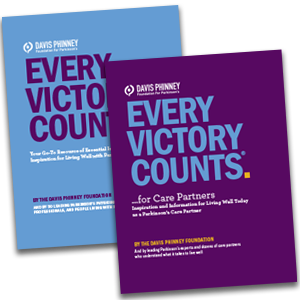 WANT MORE PRACTICAL ARTICLES LIKE THIS?
WANT MORE PRACTICAL ARTICLES LIKE THIS?
You can learn much more about living well with Parkinson’s today through our Every Victory Counts® suite of resources. Each manual is packed with up-to-date information about everything Parkinson’s. Click the link below to reserve your manual(s).
Thank you to our 2024 Gold Partner, AbbVie, and our Silver Partner, Mitsubishi Tanabe Pharma America, for their ongoing support of these must-have manuals. Additionally, we’d like to thank Barbara and Dale Ankenman, Abby and Ken Dawkins, Bonnie Gibbons, Irwin Narter, Lorraine and J Wilson, and Gail Gitin in loving memory of Gene Gitin for their generous donations that allow us to make these resources available and accessible to all.


